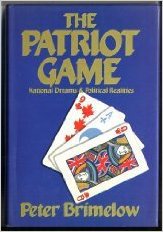


09/17/2016

Canada
is fascinating to me not least because I published my first book about Canadian politics (we'll republish it this winter since Canadian publishers are of course too Politically Correct to do so), and also for personal reasons. So I was especially irritated to see Jonathan Tepperman’s gloating article How Canada Got Immigration Right in the September 16 Wall Street Journal (where else?). There’s an excellent demolition of it by Ricardo Duchesne of the University of New Brunswick here.What struck me about Tepperman’s piece was (1) no mention of Canada’s soft totalitarianism (basically the whole country has turned into an an Ivy League campus);(2) its explicit acknowledgement of the social engineering objective behind Pierre Trudeau’s embrace of mass immigration and "multiculturalism" — as Tepperman puts it, "reducing the threat of Quebecois separatism while also easing the acceptance of the new workers that Canada so desperately needed."
Even part from the questionable enterprise of swamping the nascent Quebec nation with foreigners, Canada of course did not "desperately" need new workers any more that the U.S. did. Duschesne points out that Canadian median earnings were stagnant throughout this period. (And scroll down to Daniel Stoffman’s data here — "Canadian immigration policy lowers native wages and results in an annual transfer of CDN$30.7 billion from the poor to the rich.")
Tepperman’s real agenda:
Until after World War II, Ottawa accepted few outsiders. Even after that changed, who got in was determined by a policy unofficially known as “White Canada.” Northern Europeans were courted; swarthier types from Southern or Eastern Europe were only let in during severe manpower shortages; everybody else was basically banned.Amazingly, and indicative of the utterly uncritical environment in which he operates, Tepperman naively answers his own question:So how did that Canada — timid, racist and parochial — become the multi-hued and fiercely open-minded Canada of today?
[G]enerous government support for integration and multicultural initiatives — Ottawa currently spends an estimated $1 billion a year on celebrations of ethnic heritage, pro-immigration TV programs and the like — has driven home the message that broadening the country’s cultural makeup makes it more Canadian, not lessThis is what Paul Gottfried calls "the managerial state."